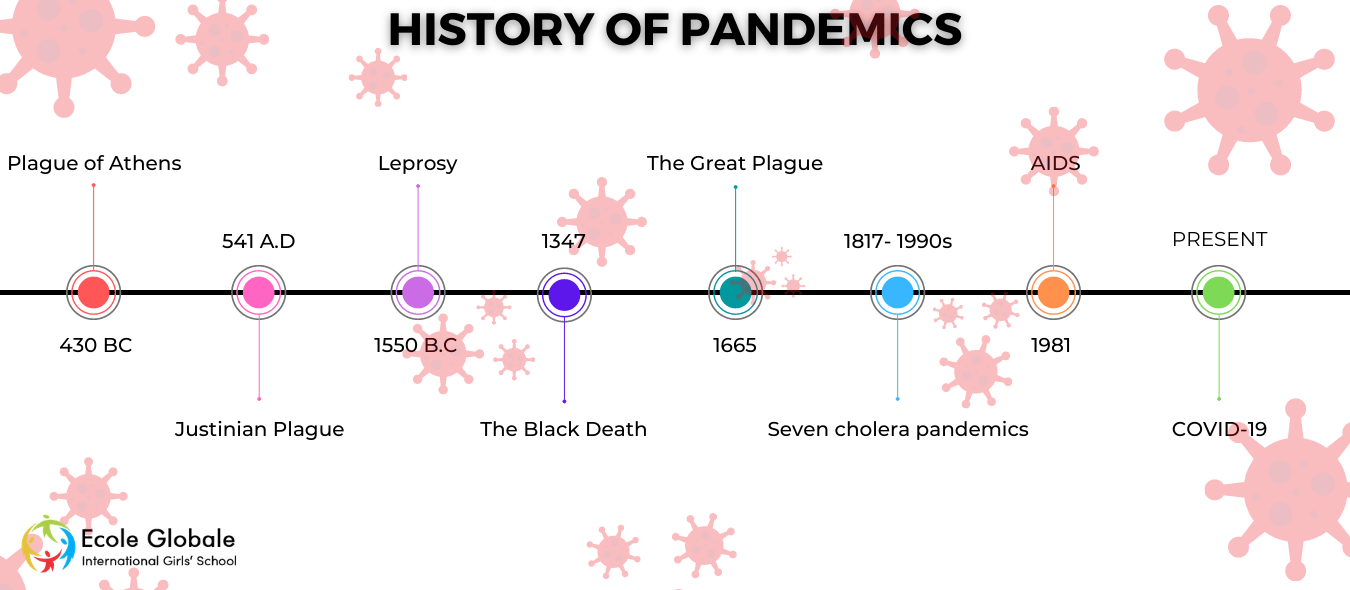The present situation that our world is facing has created a major disruption in society. The COVID-19 pandemic has changed the entire structure of the world, affecting almost every life on Earth. The pandemic is something that no one ever anticipated in their wildest dreams, but you would be surprised to know that it is not the first time since the inception of life on Earth that we are facing this situation.
What Is A Pandemic?
According to WHO, a pandemic is defined as “an epidemic happening all around the globe, or over an extended area, crossing international boundaries and usually striking a substantial amount of people.” According to this definition, it can be said that pandemics occur every year in the temperate southern and northern hemispheres as the epidemics often break through the international borders. However, they are not considered pandemics.
History Of Pandemics
Throughout ages, there have been pandemics that have shaped the medical sciences, economies, and society as a whole. The earliest pandemic dates back to 430 B.C., and the main reason is supposed to be the growing interaction between humans and the wild animals and plants that carried unknown and harmful bacterias and viruses. Though the pandemics have brought rough times, history proves that mankind makes its way through them.
- The earliest recorded pandemic took place when the Peloponnesian war was going on. The disease was spread in parts of Libya, Ethiopia, and Egypt, killing almost two-third of the population. Fever, thirst, red skin, and lesions were the symptoms, and the disease is suspected to be typhoid fever. It became the reason for the defeat of Athenians.
- In 541 A.D. Justinian Plague played a major role in history as it ruined the plans of Emperor Justinian to bring the Roman empire back together and lead to a huge economic crisis, also causing a wave of the spread of Christianity. It killed nearly 50 million people, roughly 26% of the world population.
- Leprosy, a bacterial disease that grows slowly and causes loss of sensation, skin color, and rashes, became a pandemic in the 11th century. Although leprosy had existed for a long time, it grew massively in Europe, and people believed that it was a punishment from God and hence judged people on their moral values.
- The Black Death in 1950 is responsible for the death of one-third of the world’s population. There were so many dead bodies during that time that they lay on the ground rotting and causing the foul smell in the cities. The situation became so worse that England and France declared an end to the war, and the British feudal system collapsed due to economic constraints.
- The Great Plague of London, which was caused due to the slaughtering of cats and dogs, killed nearly 20% of London’s population. The plague reached its peak in 1666, around the time when the Great Fire of London took place.
- Throughout history, seven cholera pandemics have occurred. The first one happened in 1817 when the wave originated in Russia and spread due to infected food and water. The British soldiers spread it in India, China, Japan, Germany, America, and many other countries, leading to over 3 million deaths. A vaccine was invented in 1885, but the pandemics still continued. The third wave took place in 1855, which started in China and took nearly 15 million lives. The pandemic was thought to be active till 1960 when the cases dropped below a hundred. After that, there was the Russian, Spanish, and Asian flu that became a pandemic.
- In the more recent years, AIDS, lead to the death of 35 million people since it was discovered in 1981. The disease attacks the immune system of a person resulting in death from other diseases that the body would have fought in a healthy condition.
The COVID-19 Pandemic
The most recent pandemic is the coronavirus pandemic which is still going on. It started in 2019 in Wuhan, China, and spread across the world due to international travels. So far, there have been 832,000 deaths due to coronavirus and lead to the massive economic crisis in various countries. Countries like New Zealand have been declared COVID-19 free; however, many like India are still struggling with it. Vaccines have been developed and are being provided, but people but the different mutants of the virus are causing a second wave in many places. Currently, India is very strongly struck by a second wave, and things are out of control. Hopefully, things will be back to normal soon.
Conclusion
Pandemics are not predictable and are bound to have social as well as economic repercussions. Preparedness and promptness are the main things that can help us in reducing their impacts. Being headstrong and facing the situation can help in getting through the atrocities around us during such situations.









